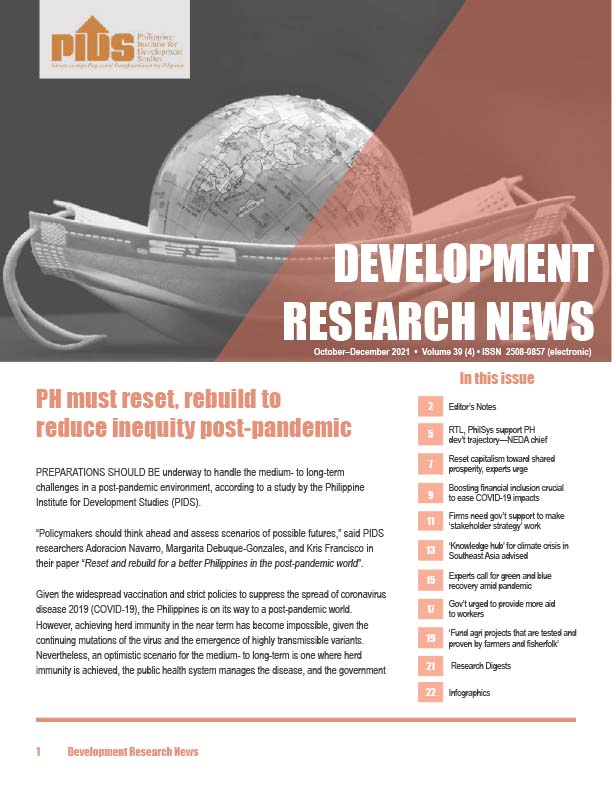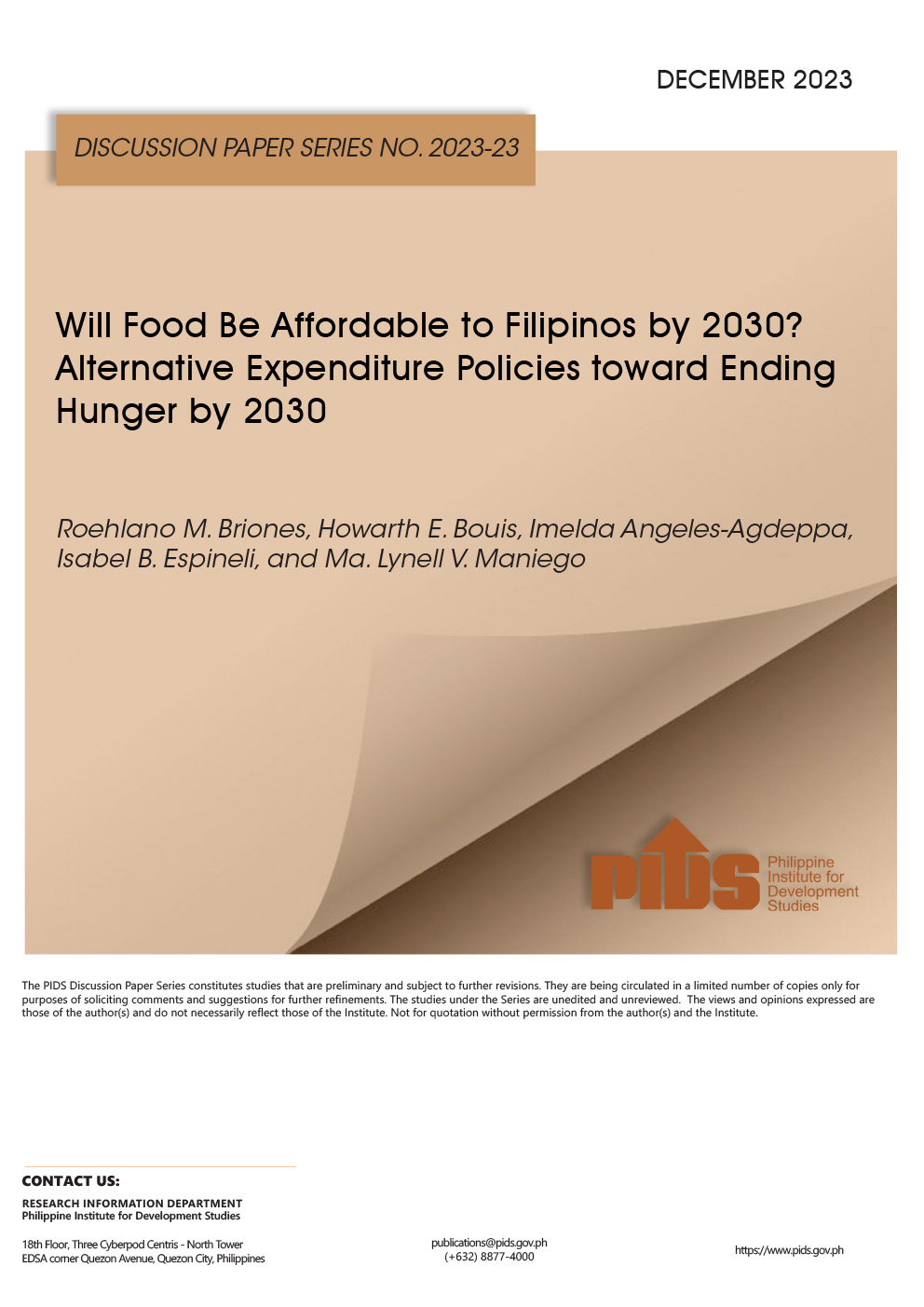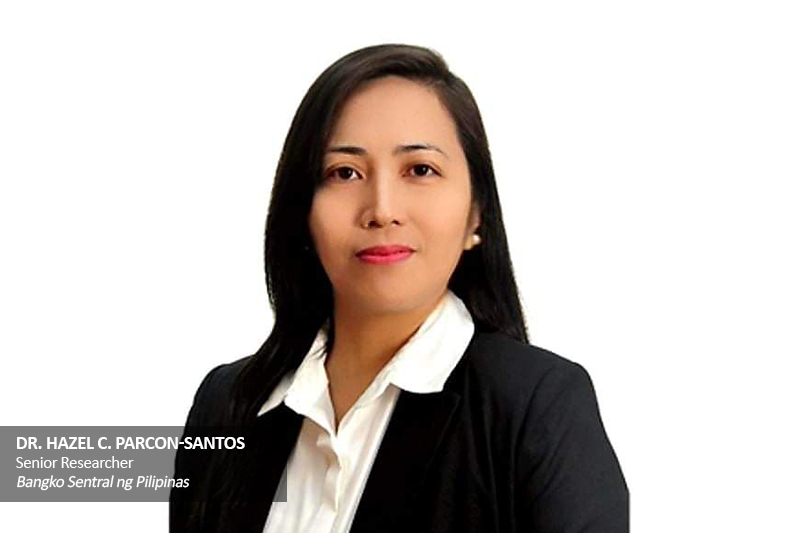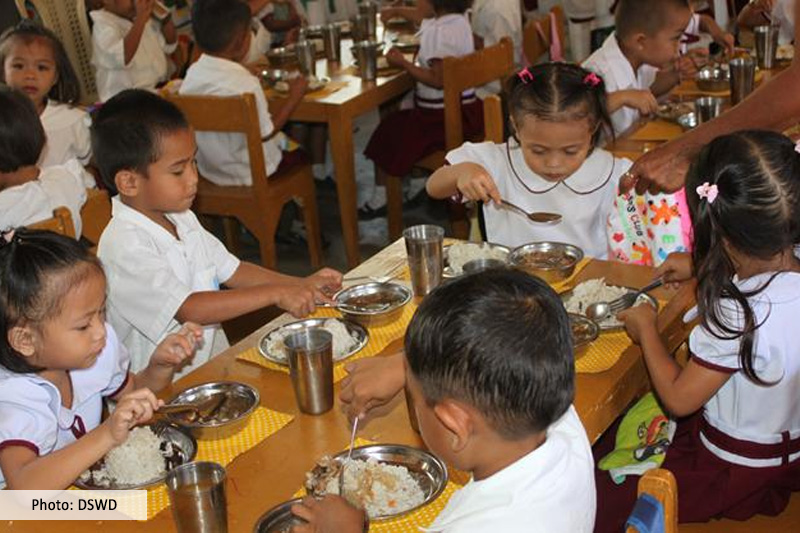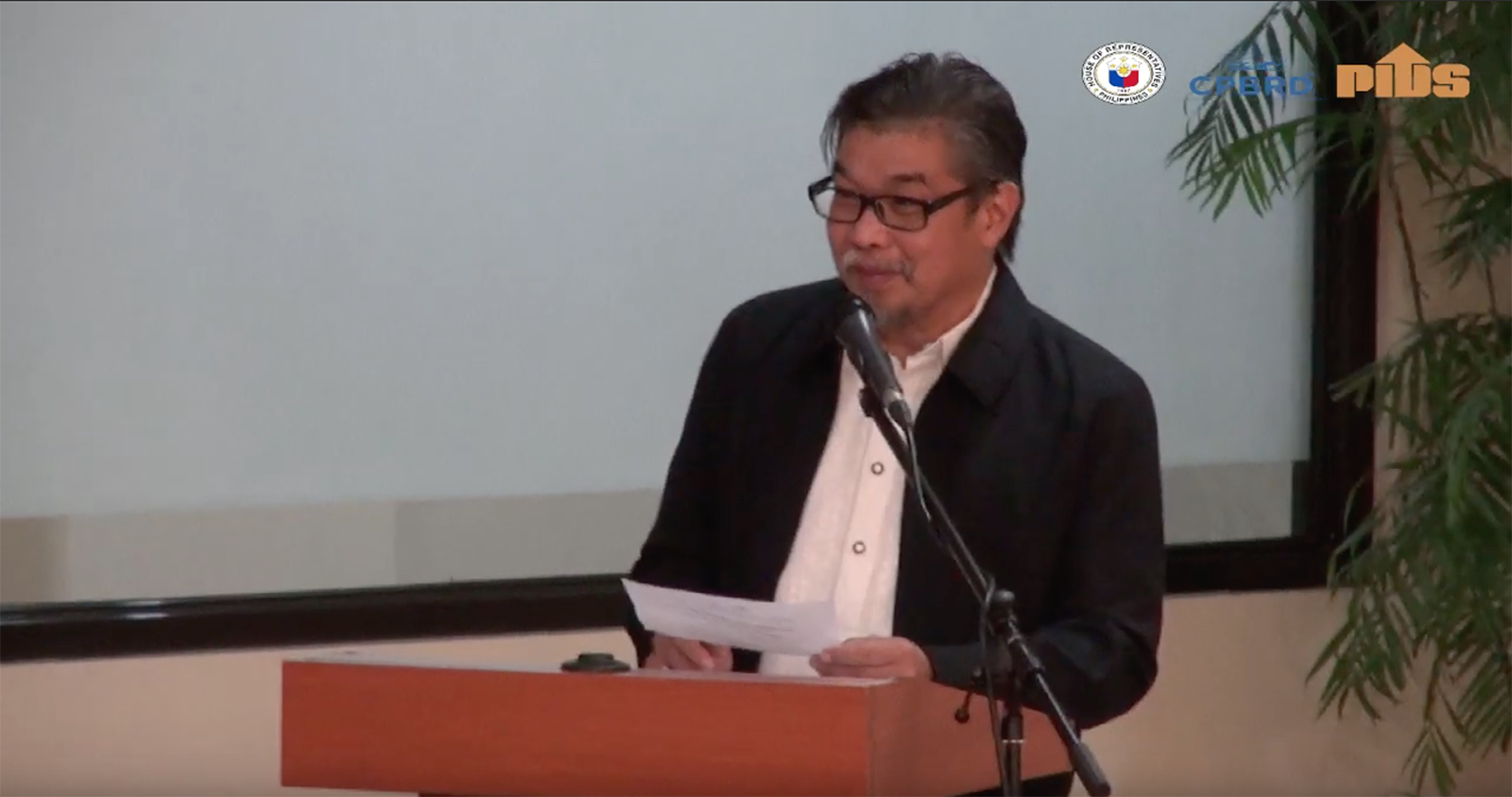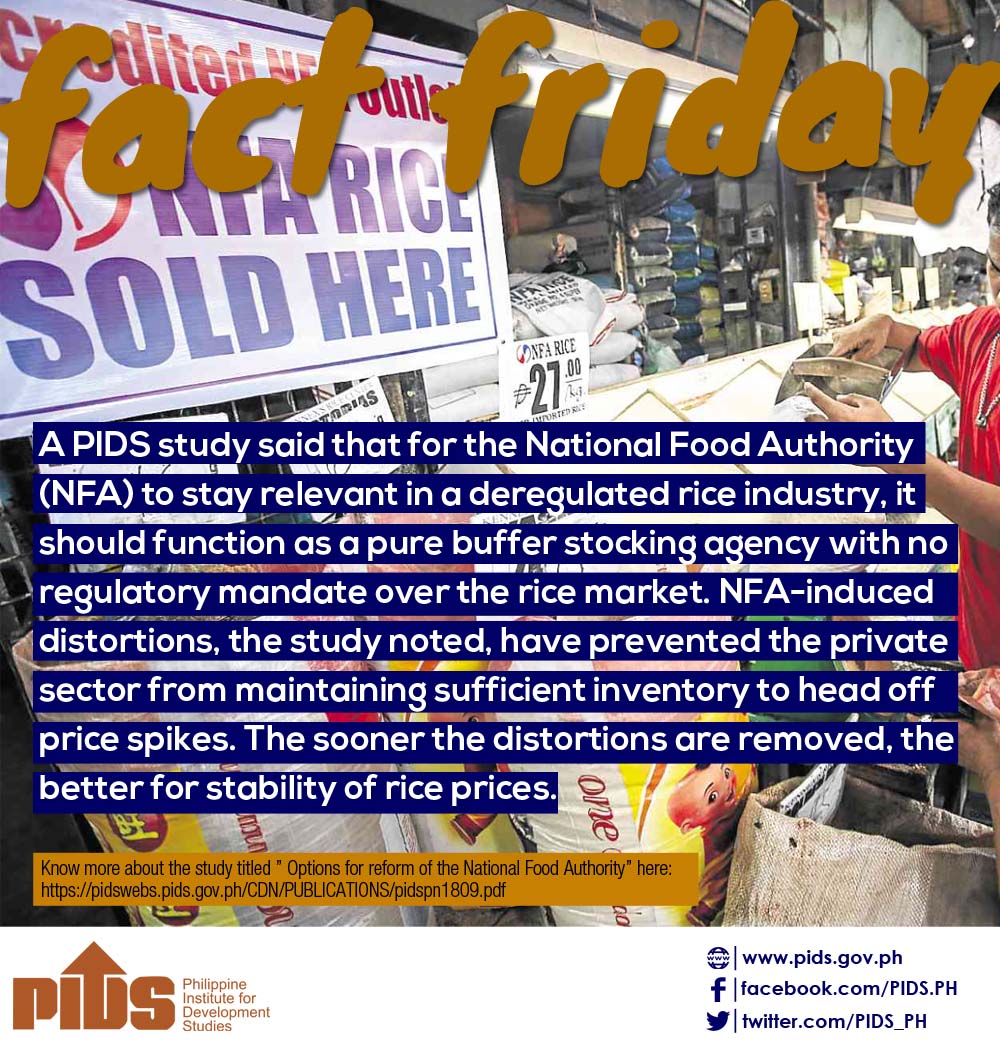Allowing the National Food Authority (NFA) to monopolize rice importation is a feasible way to end smuggling, according to the agency, the Samahang Industriya ng Agrikultura (Sinag) and agricultural think tank Meganomics Specialists International Inc.
However, the NFA and an analyst from the Philippine Institute for Development Studies (PIDS) warned
that doing so could open the country to serious repercussions from the World Trade Organization (WTO) after the country’s quantitative restriction (QR) on rice expires in 2017.
Recently, incoming Agriculture Secretary Emmanuel F. Piñol vowed that the Duterte administration will end rice smuggling in the Philippines by restricting private entities from importing the staple.
NFA Spokesman Angel G. Imperial Jr. told the BusinessMirror disallowing the private sector to ship rice into the country is legal under Presidential Decree (PD) 4, series of 1972.
“That’s possible. If you look at PD 4, it’s only the government, through the NFA, that is authorized to import. The NFA is the one that allows the private sector to import rice,” Imperial said in a phone interview
Sinag Executive Director Jayson Cainglet also agreed, underscoring that the NFA is the body that issues importation permits to the private traders.
Solution to smuggling?
According to Cainglet, private-sector importation opens an avenue for smuggling in the country.
He noted that private-sector importation was originally intended to give rice cooperatives a chance to trade the commodity. However, financiers and consolidators are taking advantage of these cooperatives to smuggle and gain profit.
“It’s not really the rice cooperatives who are importing rice. They are incapable because they don’t have the capital and the know-how. They are being used by financiers and consolidators,” Cainglet said.
When push comes to shove, the industry leader said it’s always the rice cooperatives that are pressed for charges, while the consolidators get away scot-free.
“In fact, Sinag is currently helping three cooperatives that have cases in the Court of Appeals, because their names were the ones indicated in the import permit. These rice co-ops, they can’t work, they can’t go out, whereas the consolidators are free and unpunished,” Cainglet lamented.
Sinag said it has been pushing for the government to take over the importation of the commodity for years now. He said importation through the government-to-government (G-to-G) scheme is easier to monitor.
“All rice shipments that come in to the country that are not bought by the NFA will immediately be considered smuggled,” Cainglet said.
Sinag, citing data from the United Nations Comtrade, earlier revealed that, of the P200 billion worth of agricultural goods smuggled into the country since 2010—the start of President Aquino’s term—to 2014, P94 billion were rice imports.
In terms of volume, 2.7 million metric tons (MT) of rice were smuggled from 2010 to 2014, the group added.
Aside from capping the flow of smuggled rice into the country, Meganomics President and CEO Pablito M. Villegas said government procurement of rice also reduces the import cost of importation by about 10 percent to 15 percent.
“G-to-G importation will not only curve smuggling, but will also ensure that the price of rice is just right. Meaning, they will be much cheaper than internationally traded rice that passes through the rigmarole of many intervening agents and middlemen,” Villegas claimed.
On the other hand, PIDS Senior Research Fellow
Roehlano Briones argued that it should be the done otherwise, or the private sector doing the importation.
“The presumption is that the NFA can do the importation as equally well as the private sector. I submit, no,” Briones said.
Briones pointed out that rice procurement done by the public sector will always be “a hostage of politics,” whereas the private sector will do it purely as a commercial transaction.
“[Let the private commercial business] assess the amount of rice to import as a foresight, anticipation on their part. If they make a mistake, they get burned, if they get it right, they will gain profit,” he said. “The government doesn’t have that motivation. So that’s why I’m extremely skeptical that decisions by the NFA will be in any way superior than the market’s.”
Briones also argued that simple countermeasures in the past were able to control smuggling, even with the private sector allowed to import.
“I heard from a reputable Customs authority that smuggling used to happen in major ports, as Customs examiners just collected tariffs and allowed rice to come in even without import permits. That practice has already been stopped, and now smuggling in major ports has also stopped,” he cited.
The expert called for the government to instead monitor shipments in small and nontraditional ports, where smuggling is happening now.
“Allow the private sector to import, then make sure they pay the right taxes, right sanitary and phytosanitary clearances…these are the basic things the government should check for,” he said.
WTO sanctions
Implementing the kind of rice-importation policy where only the NFA is allowed to buy rice from abroad won’t be a problem for the country until 2017, according to Imperial.
The Philippines, under the WTO, was granted permission to extend its QR until 2017. In exchange, the country has committed to increase its minimum access volume (MAV) for rice to 805,200 MT. Rice shipped into the country under the MAV scheme are slapped a tariff of 35 percent. “For now, there is no problem because what’s important to the WTO is that we import that MAV, [whether through the government or the private sector],” Imperial said.
But when asked what will happen after the QR expires, the official said, “We have to observe what is the next administration’s stand about it.”
After the Philippines scraps its QR, the assumption is that the country’s rice trade would become liberalized.
Imperial cautioned the country could face sanctions from the WTO if it pushes through with its new rice-import policy.
“There are a number of possible implications. Other members could join forces and disallow the entry of certain products from the Philippines,” he said.
Briones also warned the Philippines could be sued by its comembers in the organization.
“If you violate a provision of the WTO, then yeah, we are open to being sued. Another member can file a case against us in Geneva and then we’ll have to defend ourselves,” Briones said.
But he said there is still a way to skirt this problem.
“Basically, if you maintain an exclusive importation right to a state-trading entity, you have to show that the entity makes decisions purely on a commercial basis. So in a way, it will become like a private trader. Somehow, that concession to protection is still there in the WTO,” he explained. Villegas added it will be easy for the Philippines to explain to the WTO why the Philippines is allowing the government to monopolize rice imports.
“All of these commitments should be done not against the interest of our nation. Our excuse is that liberalization is resulting in undue economic losses. When you do a lot of this importation, and allow smuggling to continue, you distort the price of rice against the interest of the local farmers,” Villegas said.//
However, the NFA and an analyst from the Philippine Institute for Development Studies (PIDS) warned
that doing so could open the country to serious repercussions from the World Trade Organization (WTO) after the country’s quantitative restriction (QR) on rice expires in 2017.
Recently, incoming Agriculture Secretary Emmanuel F. Piñol vowed that the Duterte administration will end rice smuggling in the Philippines by restricting private entities from importing the staple.
NFA Spokesman Angel G. Imperial Jr. told the BusinessMirror disallowing the private sector to ship rice into the country is legal under Presidential Decree (PD) 4, series of 1972.
“That’s possible. If you look at PD 4, it’s only the government, through the NFA, that is authorized to import. The NFA is the one that allows the private sector to import rice,” Imperial said in a phone interview
Sinag Executive Director Jayson Cainglet also agreed, underscoring that the NFA is the body that issues importation permits to the private traders.
Solution to smuggling?
According to Cainglet, private-sector importation opens an avenue for smuggling in the country.
He noted that private-sector importation was originally intended to give rice cooperatives a chance to trade the commodity. However, financiers and consolidators are taking advantage of these cooperatives to smuggle and gain profit.
“It’s not really the rice cooperatives who are importing rice. They are incapable because they don’t have the capital and the know-how. They are being used by financiers and consolidators,” Cainglet said.
When push comes to shove, the industry leader said it’s always the rice cooperatives that are pressed for charges, while the consolidators get away scot-free.
“In fact, Sinag is currently helping three cooperatives that have cases in the Court of Appeals, because their names were the ones indicated in the import permit. These rice co-ops, they can’t work, they can’t go out, whereas the consolidators are free and unpunished,” Cainglet lamented.
Sinag said it has been pushing for the government to take over the importation of the commodity for years now. He said importation through the government-to-government (G-to-G) scheme is easier to monitor.
“All rice shipments that come in to the country that are not bought by the NFA will immediately be considered smuggled,” Cainglet said.
Sinag, citing data from the United Nations Comtrade, earlier revealed that, of the P200 billion worth of agricultural goods smuggled into the country since 2010—the start of President Aquino’s term—to 2014, P94 billion were rice imports.
In terms of volume, 2.7 million metric tons (MT) of rice were smuggled from 2010 to 2014, the group added.
Aside from capping the flow of smuggled rice into the country, Meganomics President and CEO Pablito M. Villegas said government procurement of rice also reduces the import cost of importation by about 10 percent to 15 percent.
“G-to-G importation will not only curve smuggling, but will also ensure that the price of rice is just right. Meaning, they will be much cheaper than internationally traded rice that passes through the rigmarole of many intervening agents and middlemen,” Villegas claimed.
On the other hand, PIDS Senior Research Fellow
Roehlano Briones argued that it should be the done otherwise, or the private sector doing the importation.
“The presumption is that the NFA can do the importation as equally well as the private sector. I submit, no,” Briones said.
Briones pointed out that rice procurement done by the public sector will always be “a hostage of politics,” whereas the private sector will do it purely as a commercial transaction.
“[Let the private commercial business] assess the amount of rice to import as a foresight, anticipation on their part. If they make a mistake, they get burned, if they get it right, they will gain profit,” he said. “The government doesn’t have that motivation. So that’s why I’m extremely skeptical that decisions by the NFA will be in any way superior than the market’s.”
Briones also argued that simple countermeasures in the past were able to control smuggling, even with the private sector allowed to import.
“I heard from a reputable Customs authority that smuggling used to happen in major ports, as Customs examiners just collected tariffs and allowed rice to come in even without import permits. That practice has already been stopped, and now smuggling in major ports has also stopped,” he cited.
The expert called for the government to instead monitor shipments in small and nontraditional ports, where smuggling is happening now.
“Allow the private sector to import, then make sure they pay the right taxes, right sanitary and phytosanitary clearances…these are the basic things the government should check for,” he said.
WTO sanctions
Implementing the kind of rice-importation policy where only the NFA is allowed to buy rice from abroad won’t be a problem for the country until 2017, according to Imperial.
The Philippines, under the WTO, was granted permission to extend its QR until 2017. In exchange, the country has committed to increase its minimum access volume (MAV) for rice to 805,200 MT. Rice shipped into the country under the MAV scheme are slapped a tariff of 35 percent. “For now, there is no problem because what’s important to the WTO is that we import that MAV, [whether through the government or the private sector],” Imperial said.
But when asked what will happen after the QR expires, the official said, “We have to observe what is the next administration’s stand about it.”
After the Philippines scraps its QR, the assumption is that the country’s rice trade would become liberalized.
Imperial cautioned the country could face sanctions from the WTO if it pushes through with its new rice-import policy.
“There are a number of possible implications. Other members could join forces and disallow the entry of certain products from the Philippines,” he said.
Briones also warned the Philippines could be sued by its comembers in the organization.
“If you violate a provision of the WTO, then yeah, we are open to being sued. Another member can file a case against us in Geneva and then we’ll have to defend ourselves,” Briones said.
But he said there is still a way to skirt this problem.
“Basically, if you maintain an exclusive importation right to a state-trading entity, you have to show that the entity makes decisions purely on a commercial basis. So in a way, it will become like a private trader. Somehow, that concession to protection is still there in the WTO,” he explained. Villegas added it will be easy for the Philippines to explain to the WTO why the Philippines is allowing the government to monopolize rice imports.
“All of these commitments should be done not against the interest of our nation. Our excuse is that liberalization is resulting in undue economic losses. When you do a lot of this importation, and allow smuggling to continue, you distort the price of rice against the interest of the local farmers,” Villegas said.//

